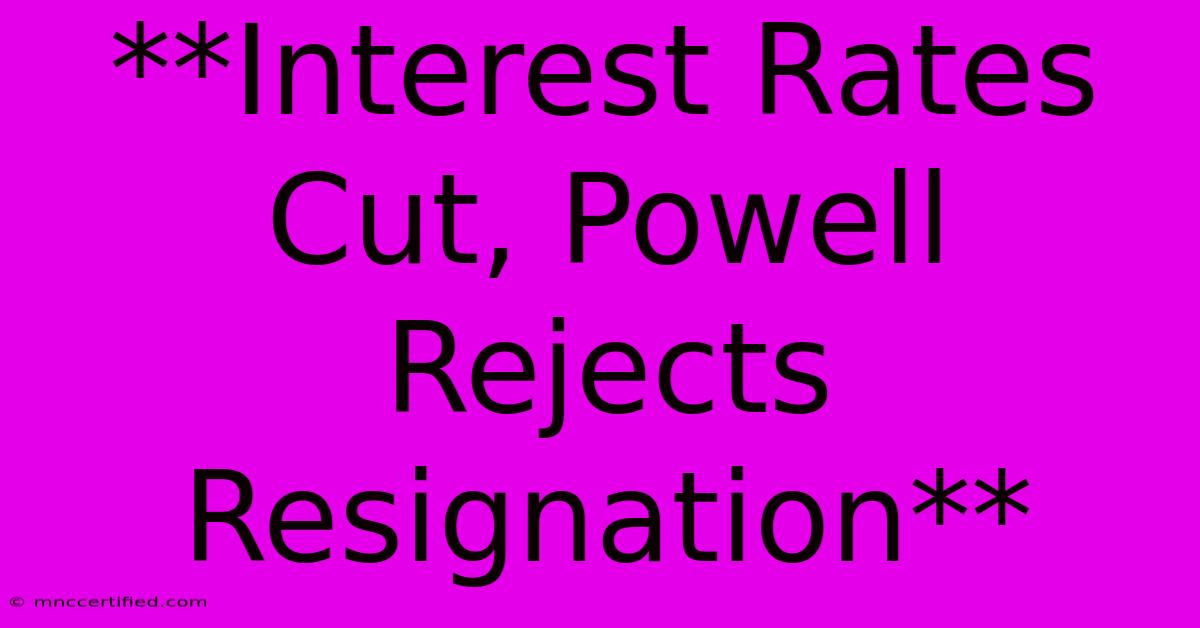**Interest Rates Cut, Powell Rejects Resignation**

Table of Contents
Interest Rates Cut, Powell Rejects Resignation: What It Means for the Economy
The Federal Reserve has announced a surprise interest rate cut, lowering the benchmark rate by 25 basis points to combat growing economic concerns. This move comes amidst mounting pressure on Chair Jerome Powell, who recently rejected calls for his resignation following criticism over the Fed's handling of inflation.
A Surprise Cut: What Does It Mean for the Economy?
The rate cut, the first since March 2023, signals a shift in the Fed's stance on the economy. While inflation remains a concern, rising unemployment and slowing economic growth have prompted policymakers to prioritize stimulating the economy.
Here's what the rate cut could mean for consumers and businesses:
- Lower borrowing costs: Businesses and individuals can now borrow money at a cheaper rate, potentially boosting investment and consumer spending.
- Stimulating growth: Lower interest rates can encourage businesses to expand operations and consumers to make larger purchases, potentially leading to increased economic activity.
- Potential for inflation: While intended to help the economy, the rate cut could also fuel inflation if it leads to excessive borrowing and spending.
Powell Stands Firm Amid Criticism
The rate cut comes as Jerome Powell faces growing scrutiny over the Fed's handling of inflation. Many critics believe the Fed's policies have contributed to rising prices, and some have called for Powell's resignation. However, Powell has steadfastly defended his actions, arguing that the Fed is doing what it can to control inflation while also supporting a strong economy.
Powell's refusal to resign sends a clear message:
- Confidence in the Fed's policies: Powell's stance suggests that he believes the Fed's current policies are the best approach to managing the economy.
- Focus on long-term stability: By rejecting calls for his resignation, Powell emphasizes the importance of stability and continuity in monetary policy, particularly during a time of economic uncertainty.
- Commitment to fighting inflation: Despite criticism, Powell remains committed to bringing inflation under control, even if it means taking unpopular measures.
The Road Ahead: Balancing Inflation and Growth
The Fed faces a delicate balancing act as it navigates the current economic climate. While inflation remains a significant concern, the central bank must also avoid stifling economic growth. The rate cut signals the Fed's willingness to consider different tools to address the complex challenges facing the economy.
The future direction of interest rates will depend on a number of factors:
- Inflation data: The Fed will closely monitor inflation data to assess the effectiveness of its policies and determine if further rate adjustments are necessary.
- Economic growth: The Fed will also closely watch indicators of economic growth, including unemployment rates and consumer spending.
- Global economic conditions: The Fed will consider global economic factors, such as the war in Ukraine and the slowdown in China, which can impact the US economy.
The coming months will be crucial for the Fed as it seeks to navigate the path to a healthy and stable economy. The rate cut and Powell's rejection of resignation demonstrate the Fed's commitment to addressing the challenges ahead, but the road to economic recovery remains uncertain.

Thank you for visiting our website wich cover about **Interest Rates Cut, Powell Rejects Resignation**. We hope the information provided has been useful to you. Feel free to contact us if you have any questions or need further assistance. See you next time and dont miss to bookmark.
Featured Posts
-
Does Delta Dental Insurance Cover Braces
Nov 08, 2024
-
Fatal Crash Closes M6 Now Reopened
Nov 08, 2024
-
Is There An Outer Banks Season 5
Nov 08, 2024
-
Shetlands Ashley Jensen Shows Future Update
Nov 08, 2024
-
Chelsea Lineup Announced Noah Game
Nov 08, 2024